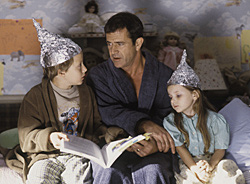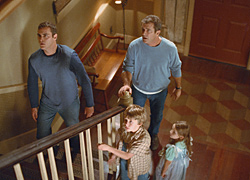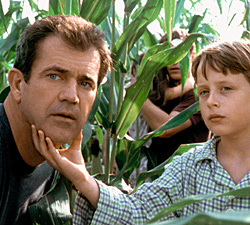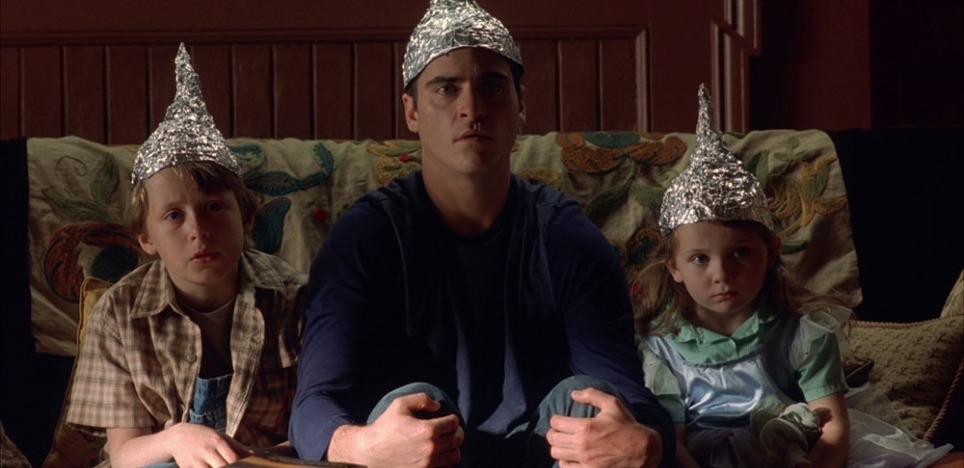
As we grow older
The world becomes stranger, the pattern more complicated
Of dead and living. Not the intense moment
Isolated, with no before or after,
But a lifetime burning in every moment
And not the lifetime of one man only
But of old stones that cannot be deciphered.
— T. S. Eliot, Four Quartets
M. Night Shyamalan, writer and director of three previous spiritual thrillers (Wide Awake, The Sixth Sense, Unbreakable) and now Signs, challenges us to consider the ways in which the world is both strange and immensely meaningful. He creates what Clarissa Pinkola Estés calls "shiver stories" that "make us shiver in recognition, for we have all experienced this." Through the story of a family facing a mystery that cannot be explained by reason, he explores the themes of the meaning of coincidences, the foundations of faith, and the way that our destiny is revealed to be "burning in every moment."
This Values & Visions Film Guide to Signs explores these themes and others with questions designed to help you relate what's happening on the screen to what's happening in your own life. The film runs 106 minutes and is rated PG-13 for some frightening moments. For our review of the film and a plot synopsis, click here.)
1. Problems Are Family Soul Food
"Remember that your family has a potential for renewed vulnerability and energy in the face of the most painful changes. We are energy, not objects, and the family is an evolving energy field of love. Remember that your family has a potential for resilience and growth. . . . Problems are family soul food," Paul Pearsall writes in The Power of The Family.
- What words would you use to describe the Hess family? Discuss the ways they are handling the grief over the tragic death of Mrs. Hess. At what point in the film do they begin to really pull together as "an evolving energy field of love"?
- What is your response to the proposition that "problems are family soul food"? How important has resiliency been to you in your experience of family life? Share a story about a problem your family confronted together. How did things turn out? What spiritual lessons did you learn?

2. Children's Spirituality
"Grown men may learn from very little children for the hearts of little children are pure, and, therefore, the Great Spirit may show them many things which older people miss," Black Elk once observed.
- The ancient Greeks initiated certain special children into the secrets of the Eleusinian mysteries; the Albigenses, a Christian sect in France in the thirteenth century, regularly queried children about their visions and prophecies; and during the past two centuries the Catholic church has charted the experiences of youth who have reported visions of the Virgin Mary along with various instructions and warnings. Yet children's spirituality is largely discounted in our society. What circumstances in our present day culture have caused us to cease trusting the spiritual impulses and insights of children?
- In what ways are Bo and Morgan spiritual? Were your spiritual qualities or tendencies as a child appreciated? Share an experience where a child or youth has been a spiritual teacher to you.
3. Faith
Faith is the response we make to a reality which transcends our control; it is the affirmation of a meaning in contradictions we cannot resolve; it is reconciliation with powers of destruction and death; it is itself an act of transcendence, out of freedom, beyond any form of nature or necessity. If reality is the word we give to the infinite creativity which gives us birth and sustains our life, then faith is the act by which we daringly share in its mysteries and, though we may tremble, walk in its darkness," Samuel H. Miller writes in Man the Believer."
- What indication of the kind of minister Graham once was is revealed in the scene in the drug store when the young clerk wants to confess her sins to him? How has Graham's loss of faith affected his children and Merrill? Share your emotional reaction to the dinner table scene when the former minister refuses to pray.
- Talk about the different stages of your journey of faith. What was the religion of your birth family? When did you experience your first doubts? Did you ever fall away from your faith in God? How did you deal with that? Share a story about a dark time in your life when your relationship with God and your sense of God's faithfulness to you were sources of strength.

4. Enemy As Teacher
"Therefore just like treasure appearing in my house without any effort on my part to obtain it, I should be happy to have an enemy for he assists me in my conduct of awakening," Shantideva wrote in a Buddhist classic.
- What is the context of the first scene where Graham spots Ray Reddy? Talk about their later encounter at Reddy's house and its significance.
- Think back over the various enemies or opponents in you life. Have you ever thought of them as spiritual teachers? Share a story about something important you have learned from an enemy.
5. Connections
"Synchronistic events urge upon us a view of the world as a unified field in which one's own experiences and actions are fundamentally connected to the experiences and actions of others. . . . If we bring a symbolic attitude to our lives, searching out the meaning of what happens to us and thereby allowing our own capacity to make wholeness out of the random events of our lives, then, no matter what happens in the plot, wherever the setting, whoever the characters, major or minor, we will see that indeed, there are no accidents in our lives," Robert C.Hopcke writes in There Are No Accidents: Synchronicities and The Stories of Our Lives.
- When does it dawn on Graham that there are no coincidences in life? What signs lead up to this? Share your reactions to the pivotal scene when everything falls into place for Graham and he is able to act with firm resolve in a life-and-death situation.
- Are you a believer in miracles and hope? Have you ever been on the other side with those who are always fearful, convinced that they are on their own without support? What experiences changed your attitude?
- Talk about coincidences that have had great meaning for you. What spiritual lessons have you taken from them?

6. Seeing
"You must learn to look at the world twice. First you must bring your eyes together in front so you can see each droplet of rain on the grass, so you can see the smoke rising from an ant hill in the sunshine. Nothing should escape your notice. But you must learn to look again, with your eyes at the very edge of what is visible, now you must see dimly, if you wish to see things that are dim — visions, mist, and cloud people, animals which hurry past you in the dark. You must learn to look at the world twice if you wish to see all there is to see," an Indian elder once told scholar Jamake Highwater.
- Which of the characters in the film is the best at the second kind of seeing as described by the Indian elder? Use the following quotation from the Protestant minister and writer Frederick Buechner to get at Graham's situation: "By grace we see what we see, to lose faith is to stop looking."
- What person, community, or resource has helped you to look at the world twice and to take seriously what James Hillman calls "the invisibles of life"? In what ways has this film encouraged you to pay more attention to the signs of grace in your life that you may have been overlooking?
7. Trust the Great Catcher
"Trust is the basis of life. Without trust, no human being can live. Trapeze artists offer a beautiful image of this. Flyers have to trust their catchers. . . . Much of our lives is flying. It is beautiful to fly in the air free as a bird, but when God isn't there to catch us, all our flying comes to nothing. Let's trust the Great Catcher," Henri J.M. Nouwen writes in Bread for the Journey.
- Graham learns to trust the helping hands that are available to us in times of tragedy or terrible struggle. Share your responses to the teachings that his dying wife gives him in her last act of love.
- Discuss other dimensions of the theme of trust in this psychological thriller. Do you trust what unfolds in your daily life? Do you make a point of reading signs? What role has the Great Catcher played in your life of flying?
This guide is one in a series of more than 200 Values & Visions Guides written by Frederic and Mary Ann Brussat. Text copyright 2002 by Frederic and Mary Ann Brussat. Photos courtesy Touchstone Pictures. This guide is posted as a service to visitors to www.SpiritualityandPractice.com. It may not be photocopied, reprinted, or distributed electronically without permission from Frederic and Mary Ann Brussat. For a list of guides in the Values & Visions series and ordering information, email your name and mailing address to: brussat@spiritualrx.com.
